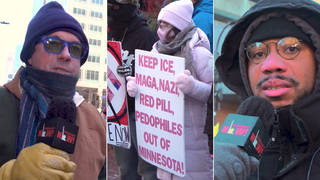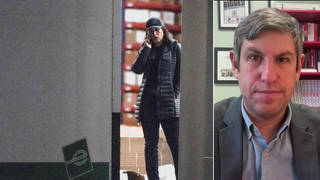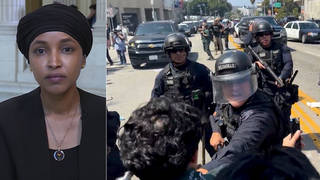
We go to Los Angeles, where immigrant workers and families are feeling the impact of ICE raids on worksites like Home Depot. While hundreds have been detained, countless others are left to wonder whether they can safely go to work or school, fearing for their families. “The life of an immigrant in Los Angeles and across this country … is full of uncertainties,” says Pablo Alvarado, co-executive director of the National Day Laborer Organizing Network. “Families don’t know whether they’re going to see their parents when they leave in the morning to go to work.”
Transcript
AMY GOODMAN: This is Democracy Now!, democracynow.org. I’m Amy Goodman.
We turn now to Los Angeles, where community-led protests have been ongoing for six days in response to President Trump’s immigration crackdown. Protests began after ICE carried out a series of operations across Southern California last week. A curfew downtown L.A. remains in effect. Nearly 400 people have been arrested since protests began Friday. President Trump’s taken the extraordinary step of federalizing the National Guard to deploy to L.A. and activating some 700 Marines over the objections of California Governor Newsom, who’s now suing the administration.
But at the center of this crisis are the immigrant workers, families, communities, who have been directly impacted by the ICE crackdown. Hundreds have been arrested in L.A. over the last week alone. This is Kimberly Hernández, whose father is now missing after a raid on a car wash where he worked.
KIMBERLY HERNÁNDEZ: We are extremely sad to not know where he is. We have not been able to find him, and this is unfair. We would like justice for him. And we would stop — we would like to live without the fear of being detained at all times.
AMY GOODMAN: As immigrant families are navigating this uncertainty, deciding whether or not to go to work, to go to school, to go to a health clinic, fearing for themselves and their families, we’re joined in Pasadena, California, by Pablo Alvarado, co-executive director of NDLON, the National Day Laborer Organizing Network.
Pablo, let’s get right down to what is so personal for so many right now in the greater Los Angeles area. Describe the day in the life of an immigrant worker.
PABLO ALVARADO: Good morning, Amy, and thank you for having me in your show.
The life of an immigrant in Los Angeles and across this country, but particularly now in our city, is full of uncertainties. For a day laborer going to a Home Depot to seek work to feed their families, it’s full with a notion of uncertainties. It’s not that — just that you don’t know whether you’re going to find a job or not, whether you’re going to get paid or not, whether you’re going to have an accident at the workplace and receive proper medical care or not. It’s now whether you’re going to be, essentially, arrested, detained, disappeared into this system of immigration that we have in this country. Families don’t know whether they’re going to see their parents when they leave in the morning to go to work. And people don’t have any other choice, because you have to provide for your family. So, it’s a lot of anguish. There’s a lot of frustration There is anger. There’s fear.
And all of these sentiments together have sparked protests all over Los Angeles, all over Southern California, not just in downtown Los Angeles. I know that people are focusing on downtown L.A., because that’s where the violence oftentimes is taking place, but there have been protests in Downey, in Pasadena, in Santa Ana, in Monrovia, in Whittier, in many places, even in front of the hotels where the ICE agents are staying.
So, yes, there’s fear. There’s that, all of those sentiments in our hearts, because the people that they are taking are members of our community. I’m going to read the — because they have names. They’re parents. They’re fathers. In the case of day laborers, they’re fathers, they’re grandfathers, they’re sons. And you see, I remember, Sergio López, Ramiro Arce, Ramiro Toc, Daniel Lopez-Papp [phon.]. They have names.
AMY GOODMAN: Pablo, you’ve been organizing day laborers for over 20 years. The Wall Street Journal has a
report, last month, the White House Deputy Chief of Staff Stephen Miller said during a meeting at the headquarters of ICE that officials should target Home Depots and 7-Eleven stores so they can detain and deport day laborers. You are part of — or, rather, if you can talk about the Pasadena Job Center, which helps connect employers with workers, and the increased significance of this focus not on murderers and rapists, but on job centers?
PABLO ALVARADO: Well, it appears that, yes, ICE and all of the federal agencies that are collaborating together are, indeed, executing the orders that Stephen Miller gave, and they are systematically going to Home Depot. And, yes, day laborers and worker centers have become part of the landscape on not just Los Angeles, but all of — in major cities across the country. Immigrant families, day laborer families are part of the socioeconomic fabric of every single community all over Los Angeles.
I happen to live in Pasadena, where the fires took place. I’m a mile and a half away from Altadena. We were impacted. There’s a worker center here. And let me tell you what happened right after the fire. It was immigrant workers that came to our place telling us, “What I possess in this life is in my body right now, but no longer not only I don’t have a job anymore — a house anymore, but I don’t have a job anymore, because the house of my employer burned down.” And yet, these are the very same people that are removing the debris. These are the same people that are remediating the homes of people adjacent to the fires. And, yes, these are the people that are going to rebuild Los Angeles. In fact, it’s impossible to rebuild Los Angeles without migrant labor. Forty percent of the workforce in the construction industry is migrant labor, and documented and undocumented. And this is the hypocrisy of what — the hypocrisy we’re fighting against all over this country. Our country is willing to accept the fruits of migrant labor, but is not willing to accept the humanity of people.
AMY GOODMAN: First fire, and then ICE — that’s what the people of Altadena and Pasadena have been exposed to. And as you were describing, Pablo, these workers are now exposed, I mean, to the toxic cleanups. They’re the ones doing this cleanup. And you have Miller saying we’ve got to expand these arrests to 3,000 a day, which — how can they do that, but go to worksites and find active workers?
PABLO ALVARADO: Well, they are saying that they are not going to go to the places that have been impacted by the fires, but they were here staying at the hotel in Pasadena. Unfortunately, the community, people from all walks of life — by the way, it’s not just migrant families that are coming out to protest the presence of ICE in our communities. It’s people from all walks of life that are coming. You know, soccer moms, I’ve never seen that, protesting to protect immigrant workers. We have the councilmembers coming out —
AMY GOODMAN: Pablo, before —
PABLO ALVARADO: — the political class, everybody coming out.
AMY GOODMAN: Before we end, you’re from El Salvador. You fled El Salvador. Now President Trump is sending people back to El Salvador, where the president of El Salvador himself calls himself a dictator. If you can respond to this possibility and what people are facing when they’re deported to the places where their very lives were threatened?
PABLO ALVARADO: You know, your question reminds me about all of this narrative about gangs. And I just want to remind Americans that gangs are a creation of this country. And when people — when gang members were deported to El Salvador, the gang problem was exported —
AMY GOODMAN: [inaudible] seconds, Pablo.
PABLO ALVARADO: — from the U.S. to El Salvador. And what —
AMY GOODMAN: Pablo, we have 15 seconds.
PABLO ALVARADO: — what the error in it now is that — well, Bukele has established a state of exception in El Salvador, and it appears that now Mr. Trump wants to import that state of exception to the United States. And it’s unacceptable, and it’s un-American, and we are going to fight it.
AMY GOODMAN: We’re going to continue this conversation in Spanish and post it on our Spanish website at democracynow.org/es. I want to thank you, Pablo Alvarado, and remind people still hundreds of people from the United States have been deported to CECOT, the maximum-security prison in El Salvador. Thank you.













Media Options